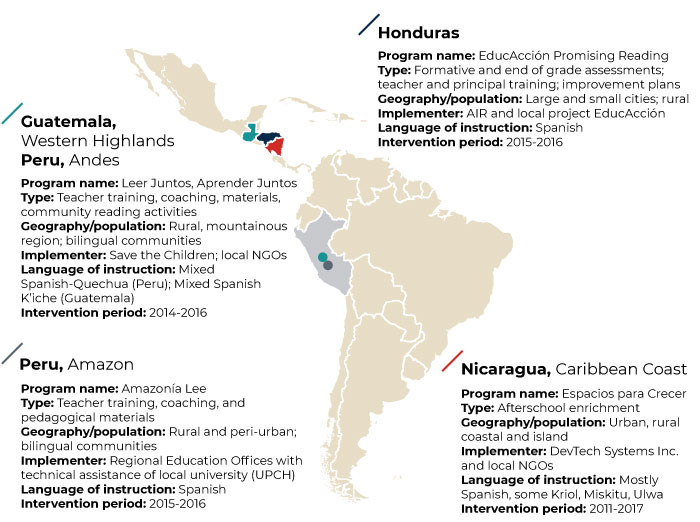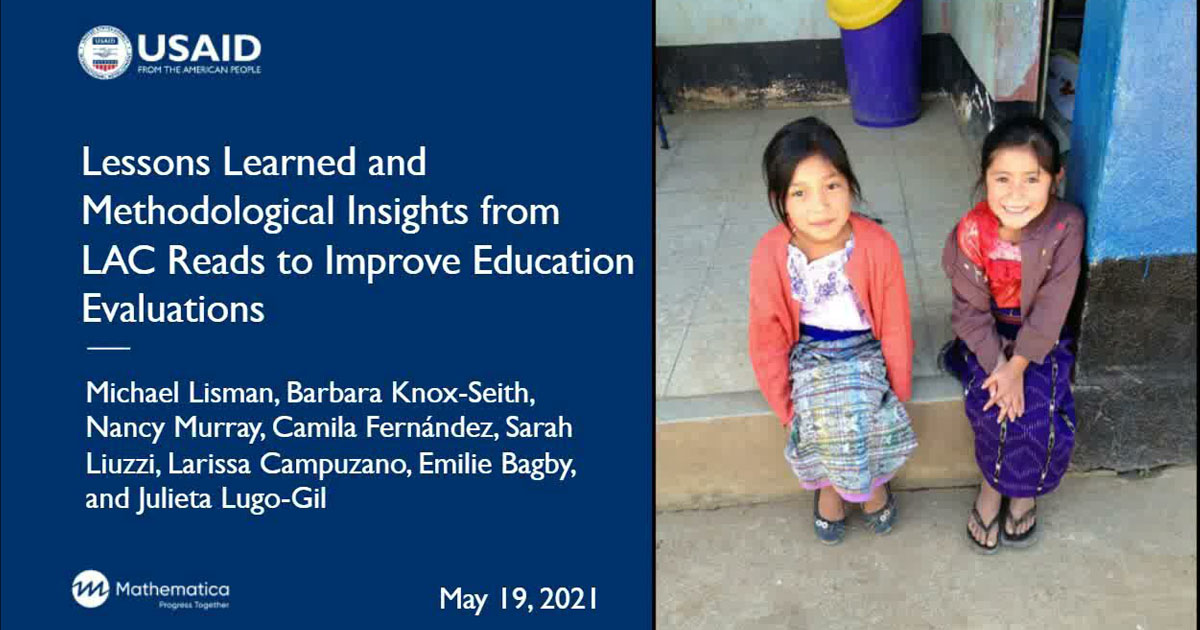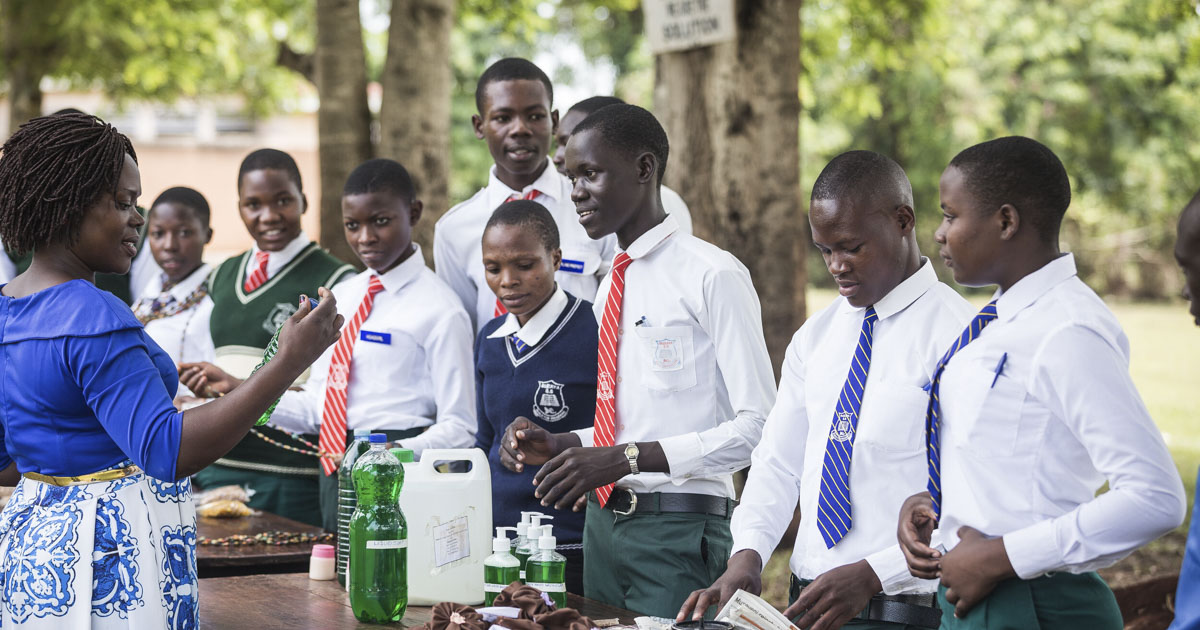Project Overview
To evaluate and cost U.S. Agency for International Development (USAID) investments in early literacy and access to education in conflict settings in the Latin America and Caribbean (LAC) region. Under this project, Mathematica conducted eight evaluations across five countries: Guatemala, El Salvador, Honduras, Nicaragua, and Peru.
LAC Reads was designed to help ministries of education and other education stakeholders improve early literacy programs and access to education in conflict settings in the LAC region by increasing the availability of, demand for, and capacity to use evidence-based, cost-effective practices.
- Grupo de Análisis para el Desarrollo (GRADE, Peru)
- Espirálica (Honduras)
- DMC (Guatemala)
- Fundación Internacional para el Desafío Económico Global (FIDEG, Nicaragua)
U.S. Agency for International Development
Latin America and the Caribbean Reads (LAC Reads)—an initiative funded by the U.S. Agency for International Development (USAID)—worked to improve both literacy and access to education in conflict areas, especially among groups of disadvantaged children and youth in conflict areas. Mathematica led one component of the LAC Reads initiative, the LAC Reading and Education Evaluation Services project. Under this project, Mathematica conducted impact evaluations of four reading interventions in Guatemala, Honduras, Peru, and Nicaragua, and three non-experimental studies including a performance evaluation of workforce programs for at-risk youth in El Salvador, an evidence review on the effects of education on violence, crime and related outcomes, and a learning agenda and community of practice with annual reports tracking of workforce development progress in Central America. We worked with local researchers who played important roles in implementing the evaluation and provided technical assistance to build local capacity in conducting and using evaluations.
Through the interventions we tested, we have expanded the evidence base on which in-school and community-level approaches work best and for whom, to improve early grade reading and other education outcomes in the LAC region. As we worked with USAID to uncover insights from LAC Reads, we conducted dissemination efforts to share this expanded education evidence base with researchers, policymakers, educators, and people around the world, so that the evidence can be used to better support early learners, youth, their schools, and their communities. We produced evaluation reports and policy briefs for each evaluation, and synthesis briefs sharing methodological insights and recommendations for carrying out impact evaluations to facilitate learning from across the evaluations. We also held workshops to facilitate learnings in country and within USAID, and public webinars where we synthesized findings from across the evaluation portfolio.
The LAC READS project includes eight evaluations (four rigorous impact evaluations using RCT designs, two process and program evaluations, one learning agenda and one comprehensive literature review) in five countries:
Studies Led
Four RCTs
- In Guatemala and Peru, we evaluated the impacts of a program that included teacher training and coaching as well as coaching and community-based reading activities.
- In Honduras, we evaluated the impacts of providing print materials and pedagogical support for the use of formative and end-of-grade assessments to educators on teaching and learning in reading and mathematics.
- In Nicaragua, we evaluated the impact of Espacios para Crecer (EpC), an after-school program for early-grade at-risk students and out-of-school children.
- In Peru, we measured the impact of Amazonía Lee, a program that delivered new pedagogical and systems approaches to instructor training, coaching, and support materials to teach early-grade reading in two Amazonian provinces.

Two process and program evaluations
- In Nicaragua, our mixed-methods midterm program evaluation assessed the implementation of Community Action for Reading and Security interventions.
- In El Salvador, our process and program evaluation of the youth WFD program Puentes para el Empleo (see Spanish version), assessed if the intervention achieved outcome targets and perceptions of program achievements; key barriers to and facilitators of implementation; the integration of gender equality, female empowerment, and social inclusion in project activities; and sustainability.
Two more learning efforts
A learning agenda documenting progress on key shared outcomes across six similar investments in youth workforce development (WFD) in Central America and a community of practice (CoP) to facilitate collaboration, learning, and adaptation (CLA). Find the annual reports below to learn more:
- First Annual Central America Workforce Development Report
- Second Annual Central America Workforce Development Report
- Third Annual Central America Workforce Development Report
A comprehensive review of the evidence on the effect of education programs on violence, crime, and correlated factors.
Evidence & Insights From This Project

Lessons Learned and Methodological Insights from LAC Reads to Improve Education Evaluations
Launched in 2012, LAC Reads was an ambitious initiative led by the U.S. Agency for International Development (USAID) and a host of partners to generate and use evidence about what works to address the early literacy crisis across much of Latin America and the Caribbean (LAC).
Learn MoreRelated Staff
From Insight to Impact: Let’s Make Progress Together
We combine data science, social science, policy research, and technologists’ expertise to help you drive smarter decisions and better outcomes. Explore our tailored solutions.
Efficiency Meets Impact.
That's Progress Together.
To solve their most pressing challenges, organizations turn to Mathematica for deeply integrated expertise. We bring together subject matter and policy experts, data scientists, methodologists, and technologists who work across topics and sectors to help our partners design, improve, and scale evidence-based solutions.
Work With Us



